- Home
- Jack Higgins
The President’s Daughter Page 2
The President’s Daughter Read online
Page 2
He gave her a cigarette and sat back. “We shouldn’t be here. We should be up there in the mud.”
A shadow crossed her face. “Like Jean?”
“I’m sorry.” He was instantly contrite and reached for her hand.
She smiled. “No, I’m the one who should be sorry. I told you I was through with ghosts, and then… Listen, I’d like to do a ride ’round in one of those horse-drawn carriages. Will you take me?”
“I thought you’d never ask,” he said and pushed his chair back.
The streets of Saigon were as noisy as usual and crowded with cars, scooters and cyclists, people everywhere, girls propping up the wall outside the bars, looking for custom.
“I wonder what they’ll all do when we go?” Cazalet asked.
“They managed after we left, the French,” she said. “Life always goes on in one way or another.”
“You should remember that,” he said and took her hand.
She didn’t resist, simply returned the pressure and peered out. “I love cities, all cities, and particularly at night. Paris, by night, for example, and the feeling of excitement, that anything might happen just up there around the next corner.”
“And usually doesn’t.”
“You are not a true romantic.”
“Teach me, then.” She turned her face toward him in the shadows and he kissed her very gently, an arm sliding around her shoulder.
“Oh, Jake Cazalet, what a lovely man you are,” she said and laid her head against his shoulder.
At the Excelsior, she got the key to her suite from reception, handed it to him without a word, and went up the broad carpeted stairway. She paused at the door of the suite, waiting, and Cazalet unlocked the door and opened it. He stood to one side, then followed her in.
She crossed to the open French window and stood on the terrace looking down at the crowded street. Cazalet slipped his arms around her waist.
“Are you sure about this?”
“Oh, yes,” she said. “As we were saying, life is for living. Give me a few moments, then come in.”
Afterwards, Cazalet lay propped up against pillows, smoking. It had been the most wonderful experience of his entire life, and now she slept quietly beside him. He checked his watch and sighed. Four o’clock and he was due at base for a briefing at eight.
He eased out of bed gently and started to dress. A muffled voice said, “You’re leaving, Jake?”
“Sure, I’m on duty. Important briefing. Can we meet for lunch?”
“That would be wonderful.”
He leaned down and kissed her forehead. “I’ll see you later, my love,” he said and went out.
The briefing was at general staff level and couldn’t be avoided. His colonel, Arch Prosser, caught him over coffee and said, “General Arlington wants words. You’ve been covering yourself with glory again.”
The general, a small energetic man with white hair, took his hand. “Damn proud of you, Lieutenant Cazalet, and your regiment is proud of you. What you did out there was sterling stuff. You’ll be interested to know that others share my view. It seems I’ve been authorized to promote you to captain.” He raised a hand. “Yes, I know you’re young for the rank, but never mind that. I’ve also put you in for the Distinguished Service Cross.”
“I’m overwhelmed, sir.”
“Don’t be. You deserve it. I had the pleasure of meeting your father three weeks ago at a White House function. He was in tiptop form.”
“That’s good to know, General.”
“And very proud, and so he should be. A young man of your background could have avoided Vietnam and yet you left Harvard and volunteered. You’re a credit to your country.”
He shook hands vigorously and walked away. Cazalet turned to Colonel Prosser. “Can I get off now?”
“I don’t see why not, Captain.” Prosser grinned. “But you don’t leave this base until you call in at the quartermaster’s and get fitted with proper rank insignia.”
He parked his jeep outside the Excelsior, went in and ran up the stairs, excited as a schoolboy. He knocked on the door of her suite and she opened it, her face wet with tears, and flung her arms around his neck.
“Oh, Jake, thank God you’re here. I was just leaving. I didn’t know if I’d see you.”
“Leaving? But – but what happened?”
“They’ve found Jean. He’s not dead, Jake! A patrol picked him up in the bush, he’s badly wounded; they flew him down this morning. He’s at Mitchell Military Hospital. Will you take me?”
Jake felt the room spinning around him, but he spoke carefully. “Of course I will. I’ve got my jeep outside. Is there anything you need?”
“No, Jake, just get me there.”
Already, she was slipping away from him, like a boat making for different waters and not his.
At the hospital, he peered through the window in the door of the private room and saw the man who was Captain Comte Jean de Brissac lying there, his head heavily bandaged, Jacqueline at his side with a doctor. They came out together.
Jake said, “How is he?”
It was the doctor who answered. “A bullet creased his skull and he was half-starved when they found him, but he’ll live. You’re both very lucky.”
He walked away, and Jacqueline de Brissac smiled through her tears. “Yes, aren’t we?” Her voice caught. “Oh, God. What do I do?”
He felt incredibly calm, knowing that she needed his strength. The tears were streaming down her face, and he took out his handkerchief and wiped them away gently. “Why, you go to your husband, of course.”
She stood there looking at him, then turned and opened the door into the private room. Cazalet went down the corridor to the main entrance. He stood on the top step and lit a cigarette.
“You know what, Jake, I’m damn proud of you,” he said softly and then he marched very fast toward the car, trying to hold back the tears that were springing to his eyes.
When his time was up, he returned to Harvard and completed his doctorate. He joined his father’s law firm, but politics beckoned inevitably, Congressman first and then he married Alice Beadle when he was thirty-five, a pleasant, decent woman for whom he had a great affection. His father had pushed for it, feeling it was time for children, but there weren’t any. Alice’s health was poor and she developed leukemia, which lasted for years.
Over the years, Jake was aware of Jean de Brissac’s rise to the rank of full general in the French Army. Jacqueline was a memory so distant that what had happened seemed like a dream, and then de Brissac died of a heart attack. There was an obituary in the New York Times, a photo of the general with Jacqueline. On reading it, Cazalet discovered there was only one child, a daughter named Marie. He considered writing but then thought better of it. Jacqueline didn’t need an embarrassing echo of the past. What would be the point?
No, best to leave well enough alone…
Once elected Senator and regarded as a coming man, he had to take trips abroad on government business, usually on his own, for Alice simply wasn’t up to it. So it was that in Paris in 1989, on government business, he was once again on his own, except for his faithful aide and private secretary, a one-armed lawyer named Teddy Grant. Amongst other things, there was an invitation to the Presidential Ball. Cazalet was seated at the desk in the sitting room of his suite at the Ritz when Teddy dropped it in front of him.
“You can’t say no, it’s a command performance like the White House or Buckingham Palace, only this is the Élysée Palace.”
“I haven’t the slightest intention of saying no,” Cazalet told him. “And I’d like to point out it says Senator Jacob Cazalet and companion. For tonight, that means you, Teddy, so go find your black tie.”
“Oh, I don’t mind,” Teddy told him. “Free champagne, strawberries, good-looking women. For you, anyway.”
“Good-looking French women, Teddy. But I’m not in the market anymore, remember? Now get out of here.”
The ball was every
thing one could have hoped for, held in an incredible salon, an orchestra playing at one end. All the world seemed to be there, handsome men, beautiful women, uniforms everywhere, church dignitaries in purple or scarlet cassocks. Teddy had departed to procure some more champagne, and Cazalet stood alone on the edge of the dance floor.
A voice said, “Jake?”
He turned around and found her standing there, wearing a small diamond tiara and a black silk ballgown. “My God, it’s you, Jacqueline.”
The heart turned over in him as he took her hands. She was still so beautiful it was as if time had stood still. She said, “Senator Cazalet now. I’ve followed your career with such interest. A future President, they say.”
“And pigs might fly.” He hesitated. “I was sorry to hear of your husband’s death last year.”
“Yes. It was quick, though. I suppose one can’t ask for more than that.”
Teddy Grant approached with a tray holding two glasses of champagne. Cazalet said, “Teddy, the Comtesse de Brissac… an old friend.”
“Not the Teddy Grant from that Harvard cafeteria?” She smiled. “Oh, I truly am pleased to meet you, Mr. Grant.”
“Hey, what is this?” Teddy asked.
“It’s okay, Teddy. Go and get another glass of champagne and I’ll explain later.”
Teddy left, looking slightly flummoxed, and he and Jacqueline sat down at the nearest table. “Your wife isn’t with you?” she asked.
“Alice has been fighting leukemia for years.”
“Oh, I’m sorry.”
“She’s a brave woman, but it dominates her life. That’s why we didn’t have any kids. You know, it’s ironic. My father, who died last year, too, urged me to marry Alice because he thought I should have a family. People worry about politicians who don’t.”
“Didn’t you love her?”
“Oh, I have a great deal of affection for Alice, but love?” He shook his head. “I’ve only known love once.”
She touched his arm. “I’m sorry, Jake.”
“So am I. We all lost – Alice, you, and me. I sometimes think I came off worst, having no kids.”
“But you do, Jake,” she said gently.
Time seemed to stop for Jake. “What do you mean?” he said at last.
“Look over there, just at the French window to the terrace,” Jacqueline said.
The girl’s hair was long, the white dress very simple. For a heart-stopping moment, it might have been her mother.
“You wouldn’t kid a guy,” he whispered.
“No, Jake, that would be too cruel. She was conceived that one night in Saigon, and born in Paris in nineteen-seventy. Her name is Marie and she is halfway through her first year at Oxford.”
Jake couldn’t take his eyes off the girl. “Did the general know?”
“He assumed she was his, or so I thought, until the end, when the doctors told him just how bad his heart was.”
“And?”
“It seems that while he was in the hospital in Vietnam after being found up-country, that someone sent him a letter. It told him that his wife had been seen with an American officer, who had not left her suite until four o’clock in the morning.”
“But who-?”
“A member of staff, we think. The maliciousness of it! Sometimes I despair of human beings. But he had known, all that time, my dear Jean. Before he died, he signed a declaration under the provisions of the Code Napoléon, stating that he was Marie’s titular father. It was to preserve her position and title legally.”
“And she doesn’t know?”
“No, and I don’t want her to, and neither do you, Jake. You’re a good man, an honorable man, but a politician. The great American public doesn’t take kindly to politicians who have illegitimate daughters.”
“But it wasn’t like that. Dammit, everyone thought your husband was dead.”
“Jake, listen to me. You could be President one day, everybody says that, but not with this sort of scandal hanging over you. And what about Marie? Isn’t it better if she just lives with her memory of her father, the general? No, if Marie isn’t told, that leaves only two people in the world who know – you and me. Are we agreed?”
Jake gazed at the lovely girl by the window, and then back at her mother. “Yes,” he said. “Yes, you’re right.”
She took his hand. “I know. Now… would you care to meet her?”
“My God, yes!”
She led the way to the French windows. “She has your eyes, Jake, and your smile. You’ll see.”
Marie de Brissac turned from speaking to a handsome young officer. “Mama,” she smiled. “I’ve said it before, but you look incredible in that dress.”
Jacqueline kissed her on both cheeks. “Thank you, cherie.”
Marie said, “This is Lieutenant Maurice Guyon of the French Foreign Legion, just back from the campaign in Chad.”
Guyon, very military, very correct, clicked his heels and kissed Jacqueline’s hand. “A pleasure, Countess.”
“And now allow me to introduce Senator Jacob Cazalet from Washington. We’re good friends.”
Guyon responded with enthusiasm. “A pleasure, Senator! I read the article about you last year in Paris Soir. Your exploits in Vietnam were admirable, sir. A remarkable career.”
“Well, thank you, Lieutenant,” Jake Cazalet said. “That means a lot, coming from someone like you.” He turned and took his daughter’s hand. “May I say that, like your mother, you look wonderful.”
“Senator.” She had been smiling, but now it faded and there was only puzzlement there. “Are you sure we haven’t met before?”
“Absolutely.” Jake smiled. “How could I have possibly forgotten?” He kissed her hand. “Now, if you’ll excuse me, I’d like to dance with your mother.”
As they circled the floor, he said to Jacqueline, “Everything you said – everything – is true. She’s wonderful.”
“With such a father, she would be.”
He looked down at her with enormous tenderness. “You know, I think I never stopped loving you, Jacqueline,” he said. “If only-”
“Hush,” she said, putting her fingers to his lips. “I know, Jake, I know. But we can be happy with what we have.” She smiled. “Now, let’s put some life into those feet, Senator!”
He never saw her again, the years rolled on, his wife finally died from the leukemia that had plagued her for years, and it was a chance meeting with the French ambassador at a function in Washington three years after the Gulf War that brought him up to date. He and Teddy were standing with him on the lawn at the White House.
The ambassador said, “Congratulations would seem in order. I understand the Presidential nomination is yours for the asking.”
“A little premature,” Jake said. “There’s still Senator Freeman, if he decides to run.”
“Don’t listen to him, Mr. Ambassador, he can’t fail,” Teddy said.
“And I must believe you.” The ambassador turned to Cazalet. “After all, as everyone knows, Teddy is your éminence grise.”
“I suppose so.” Jake smiled. Then, he didn’t know why – was it the music? – he said, “Tell me, Ambassador, there’s a friend of mine I haven’t seen in many years, the Comtesse de Brissac – do you know her?”
An odd expression came over the ambassador’s face, then he said, “Mon Dieu, I was forgetting. You saved her life in Vietnam.”
“Hell, I’d forgotten that one,” Teddy said. “That’s how you got your D.S.C.”
“You are not in touch?” the ambassador said.
“Not really.”
“The daughter was engaged to a Captain Guyon, a fine boy. I knew the family. Unfortunately, he was killed in the Gulf.”
“I am very sorry to hear that. And the Countess?”
“Cancer, my friend, at death’s door, as I understand it. A great pity.”
Cazalet said to Teddy, “I’ve got to get out of here, and fast. Two things.” He was walking rapidly along a White Hou
se corridor. “Get in touch with our Embassy in Paris and check on the present condition of the Comtesse de Brissac, then phone the airport and tell them to get the Gulfstream ready for a flight to Paris.”
His mother’s death a couple of years before had left him very wealthy, although with his interest in politics, he was content to put it all in a blind trust and leave the finances to others. However, it did give him the privileges of rank, and the Gulfstream private jet was one of them.
Teddy was already speaking over his mobile phone, and as they reached the limousine, said, “They’ll call me.” They got in the rear and he closed the glass partition between them and the driver. “Jake, is there trouble? Anything I should know about?”
Cazalet did an unusual thing for him during the day. He reached for the bar and selected a crystal glass. “Pour me a Scotch, Teddy.”
“Jake, are you okay?” Teddy said anxiously.
“Sure I am. The only woman I ever truly loved is dying of cancer and my daughter is all alone, so give me a Scotch.”
Teddy Grant’s eyes widened and he poured. “Daughter, Jake?”
Cazalet took the Scotch down in one swallow.
“That was good,” he said, and then he told him everything.
In the end, the mad dash across the Atlantic proved fruitless. Jacqueline de Brissac had died two weeks before. They had missed the funeral by five days. Cazalet seemed to find himself moving in slow motion and it was Teddy who saw to everything.
“She was laid to rest in the de Brissac family mausoleum. That’s in a cemetery at Valency,” he said, turning from the phone in their suite at the Ritz.
“Thanks, Teddy. We’ll pay our respects.”
Cazalet looked ten years older as they settled in the limousine, and Teddy Grant cared for him more than any other person on this earth, more even than he cared for his long-term partner, who was a professor of physics at Yale.
Cazalet was the brother he’d never had, who’d taken interest in his career ever since the cafeteria incident at Harvard, had given him a job with the family law firm, had given him the totally unique job of being his personal assistant, and Teddy had grabbed it.

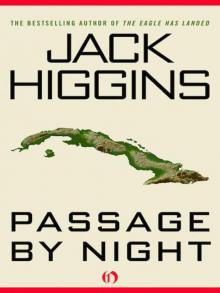 Passage by Night (v5)
Passage by Night (v5) The Death Trade sd-20
The Death Trade sd-20 Cold Harbour
Cold Harbour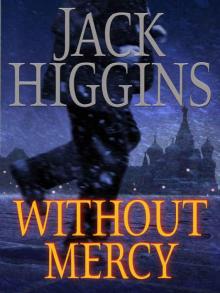 Without Mercy
Without Mercy Solo (Aka the Cretan Lover)(1980)
Solo (Aka the Cretan Lover)(1980) First Strike
First Strike Confessional - Devlin 03 (v5)
Confessional - Devlin 03 (v5)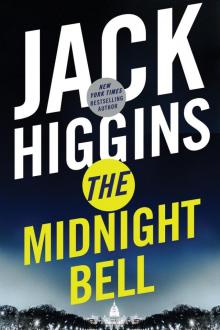 The Midnight Bell
The Midnight Bell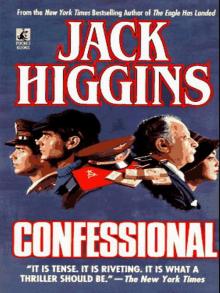 Confessional
Confessional Sad Wind from the Sea (v5)
Sad Wind from the Sea (v5)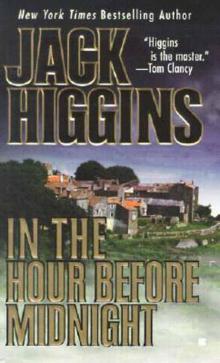 In The Hour Before Midnight aka The Sicilian Heritage
In The Hour Before Midnight aka The Sicilian Heritage Wrath of the Lion
Wrath of the Lion SDillon 20 - The Death Trade
SDillon 20 - The Death Trade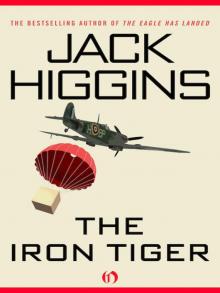 the Iron Tiger (1974)
the Iron Tiger (1974)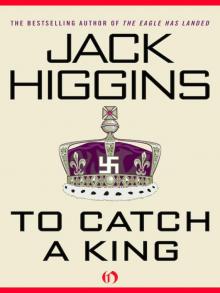 To Catch a King
To Catch a King Bloody Passage (1999)
Bloody Passage (1999) Wrath of the Lion sd-8
Wrath of the Lion sd-8 Sharp Shot
Sharp Shot Pay the Devil (v5)
Pay the Devil (v5) A Devil Is Waiting
A Devil Is Waiting Dark Side of the Street - Simon Vaughn 01 (v5)
Dark Side of the Street - Simon Vaughn 01 (v5)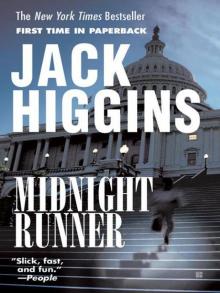 Midnight Runner - Sean Dillon 10
Midnight Runner - Sean Dillon 10 Wrath of God
Wrath of God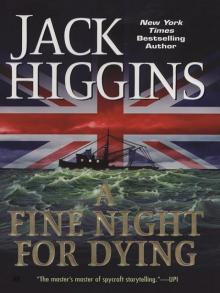 A Fine Night for Dying
A Fine Night for Dying Hell Is Too Crowded v5)
Hell Is Too Crowded v5)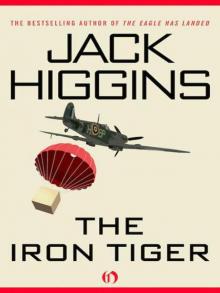 the Iron Tiger (v5)
the Iron Tiger (v5) Dark Side of the Street pc-5
Dark Side of the Street pc-5 Hell Is Always Today
Hell Is Always Today Eagle Has Landed
Eagle Has Landed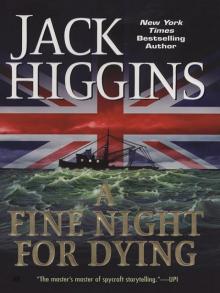 A Fine Night for Dying pc-6
A Fine Night for Dying pc-6 the Last Place God Made (v5)
the Last Place God Made (v5) the Valhalla Exchange (1976)
the Valhalla Exchange (1976) The Eagle Has Flown
The Eagle Has Flown Sure Fire
Sure Fire Pay the Devil (1999)
Pay the Devil (1999) Memoirs of a Dance Hall Romeo
Memoirs of a Dance Hall Romeo![a Prayer for the Dying (1974)[1] Read online](http://i1.bookreadfree.com/i1/04/02/a_prayer_for_the_dying_19741_preview.jpg) a Prayer for the Dying (1974)[1]
a Prayer for the Dying (1974)[1] Comes the Dark Stranger
Comes the Dark Stranger Dark Side Of the Island (v5)
Dark Side Of the Island (v5)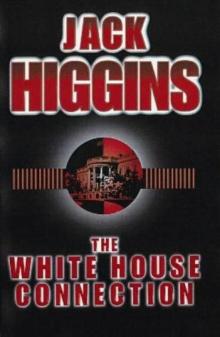 The White House Connection sd-7
The White House Connection sd-7 Dillinger (v5)
Dillinger (v5) Eye of the Storm
Eye of the Storm Eye Of The Storm aka Midnight Man
Eye Of The Storm aka Midnight Man A Darker Place
A Darker Place Year Of The Tiger
Year Of The Tiger Death Run
Death Run the Savage Day - Simon Vaughn 02 (v5)
the Savage Day - Simon Vaughn 02 (v5) Bloody Passage (v5)
Bloody Passage (v5) The Bormann Testament
The Bormann Testament On dangerous ground sd-3
On dangerous ground sd-3 Dark Justice
Dark Justice Sheba
Sheba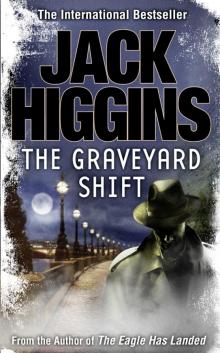 The Graveyard Shift
The Graveyard Shift Exocet (1983)
Exocet (1983) The Wolf at the Door
The Wolf at the Door The wolf at the door sd-17
The wolf at the door sd-17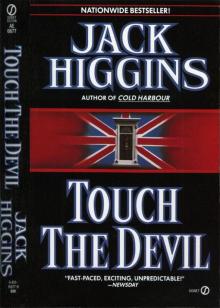 Touch The Devil
Touch The Devil The President’s Daughter
The President’s Daughter A Prayer for the Dying (v5)
A Prayer for the Dying (v5)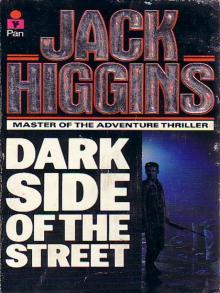 Dark Side Of The Street
Dark Side Of The Street Dillinger (1983)
Dillinger (1983) Midnight Never Comes pc-4
Midnight Never Comes pc-4 Hell Is Too Crowded (1991)
Hell Is Too Crowded (1991)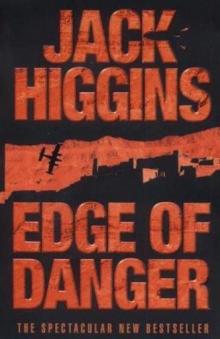 Edge of Danger sd-9
Edge of Danger sd-9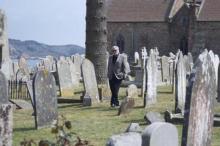 The Thousand Faces of Night (v5)
The Thousand Faces of Night (v5)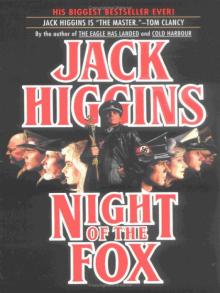 Night Of The Fox
Night Of The Fox Bad Company
Bad Company The Killing Ground
The Killing Ground The Judas gate sd-18
The Judas gate sd-18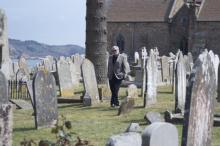 The Thousand Faces of Night (1961)
The Thousand Faces of Night (1961) Solo (Aka the Cretan Lover) (v5)
Solo (Aka the Cretan Lover) (v5) The Dark Side Of The Island
The Dark Side Of The Island A Devil is vaiting sd-19
A Devil is vaiting sd-19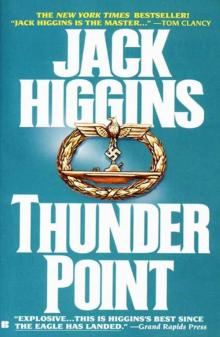 Thunder Point
Thunder Point Day of Reckoning sd-8
Day of Reckoning sd-8 the Valhalla Exchange (v5)
the Valhalla Exchange (v5)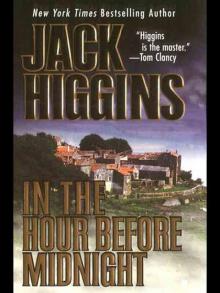 In the Hour Before Midnight
In the Hour Before Midnight The Bormann Testament (The Testament of Caspar Schultz)
The Bormann Testament (The Testament of Caspar Schultz) The Judas Gate
The Judas Gate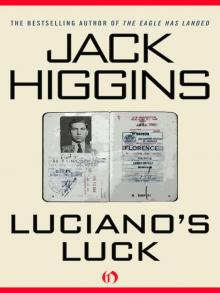 Luciano's Luck
Luciano's Luck Sad Wind from the Sea (1959)
Sad Wind from the Sea (1959)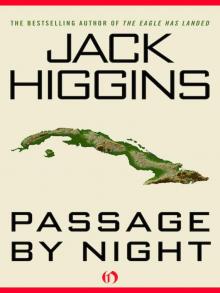 Passage by Night (1987)
Passage by Night (1987) Exocet (v5)
Exocet (v5)